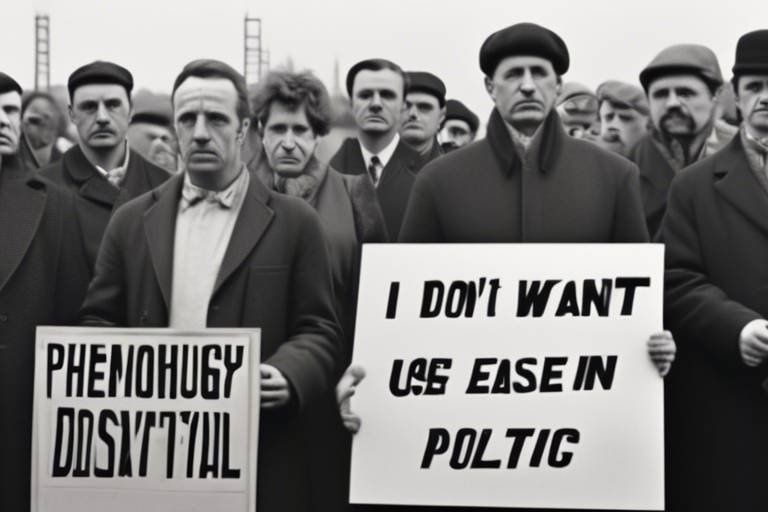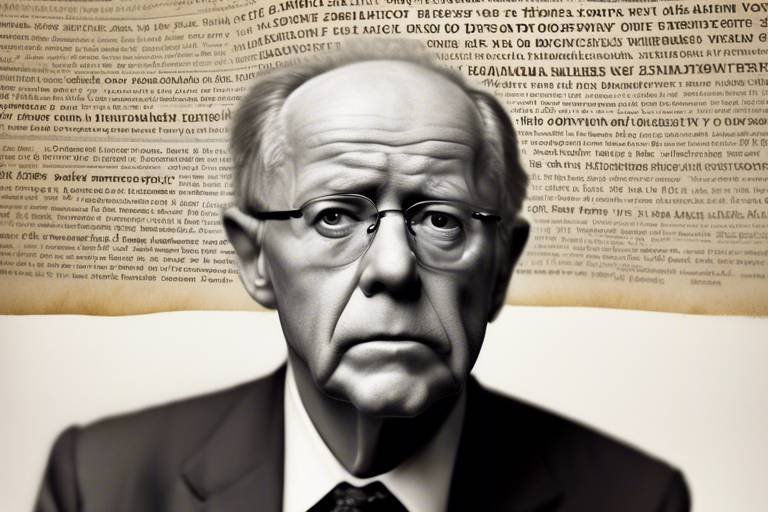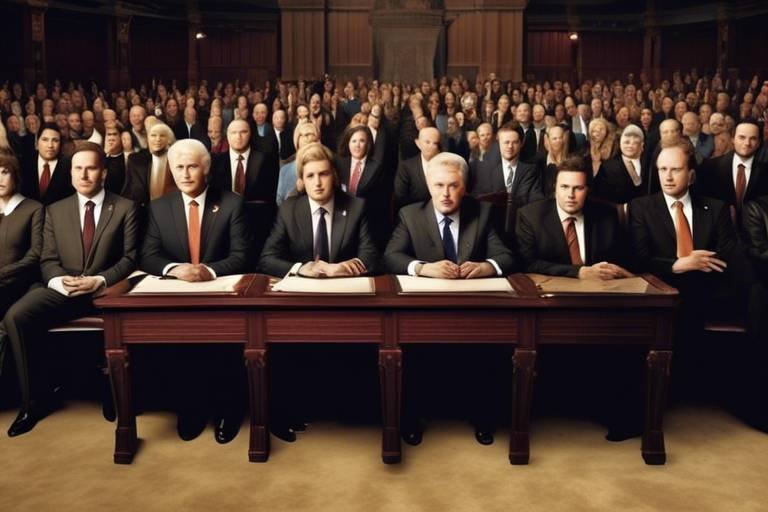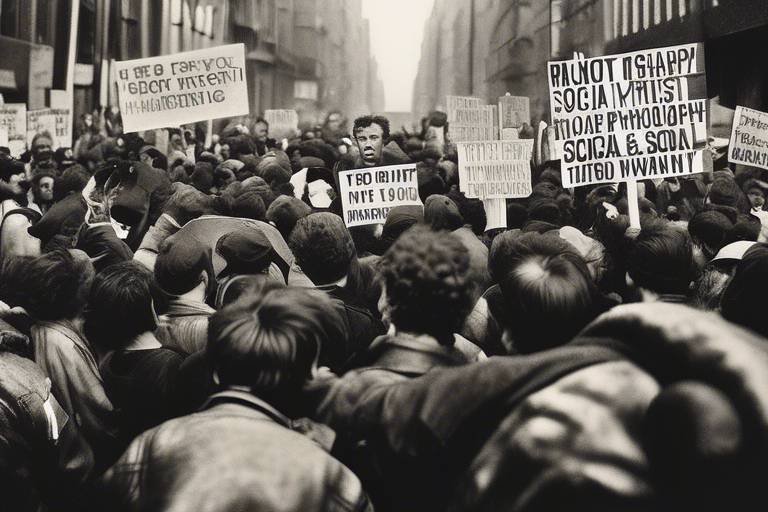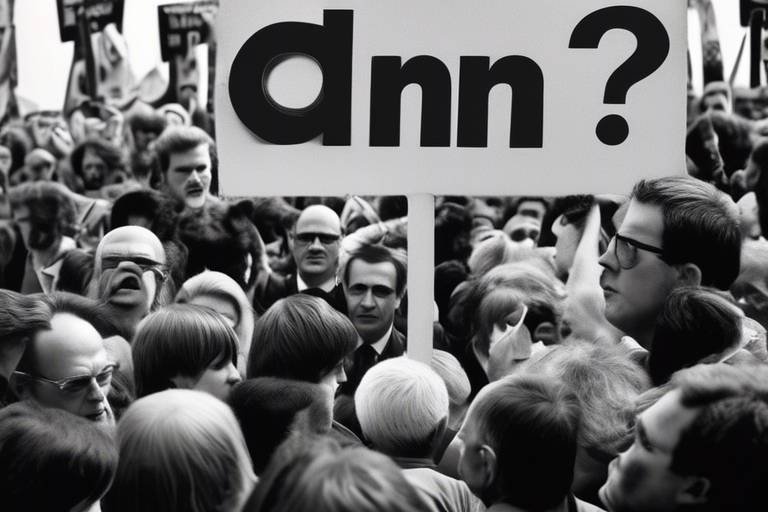How Political Philosophy Shapes Social Movements
In the vibrant tapestry of human society, political philosophy serves as both a compass and a catalyst for social movements. It’s fascinating to think about how a few powerful ideas can mobilize masses and ignite change. When we dig deeper, we realize that these philosophies are not just abstract concepts; they are the lifeblood of activism, guiding the dreams and actions of those who seek to transform their world. So, how exactly does this intricate relationship unfold?
At its core, political philosophy offers a framework through which activists can articulate their grievances and aspirations. Think of it as the blueprint for social change. Ideologies like liberalism, socialism, and feminism provide a lens through which movements can define their goals, strategies, and even their identities. This is why understanding various political philosophies is crucial; it sheds light on how movements gain traction and mobilize supporters. For instance, the civil rights movement in the United States drew heavily from the principles of equality and justice articulated by Enlightenment thinkers, showcasing how philosophical ideas can be transformed into powerful movements.
Moreover, the historical context of political philosophy is equally significant. Each era of thought reflects the challenges and aspirations of its time, shaping the movements that arise from it. Take a moment to consider how the Industrial Revolution spurred the development of socialist thought, which in turn fueled labor movements. By examining the evolution of political thought, we can better understand the motivations behind contemporary activism and the societal changes they strive for.
As we explore this relationship further, we cannot overlook the impact of Enlightenment thinkers. Figures like John Locke and Jean-Jacques Rousseau introduced groundbreaking ideas about liberty and equality that continue to resonate in modern activism. Locke’s theory of natural rights, for instance, emphasizes the importance of individual freedoms. This concept has inspired countless movements advocating for civil rights and personal liberties throughout history, reminding us that the quest for freedom is timeless.
On the other hand, Rousseau’s notion of the social contract highlights the significance of the collective will. His ideas have motivated movements focused on democracy and community engagement, illustrating how political philosophy can unite individuals towards a common cause. The essence of these philosophies is that they provide the language and rationale for collective action, empowering people to rise up and demand change.
In today’s world, we see the emergence of modern political theories like feminism and environmentalism, which shape current social movements in profound ways. These ideologies address specific societal issues, advocating for change that reflects the needs and values of diverse communities. Feminism, for example, challenges patriarchal norms and seeks to redefine power dynamics, while environmentalism pushes for sustainable practices in the face of climate change. Both movements are not just reactions to existing conditions but are deeply rooted in a philosophical understanding of justice, equity, and responsibility.
Ultimately, the relationship between political philosophy and social movements is not one-sided. Social movements not only arise from these philosophies but also challenge and reshape them. This dynamic interaction leads to the evolution of ideas and practices in governance, as activists push the boundaries of established thought. By analyzing successful movements, we can uncover how political philosophies were adapted to achieve specific goals, providing valuable lessons for future activism.
As we look to the future, it’s clear that the interplay between political philosophy and social movements will continue to evolve. Emerging ideologies and global challenges will shape the next wave of activism and political thought. The questions we must ask ourselves are: What new philosophies will emerge? How will they influence the movements of tomorrow? The answers to these questions will define the landscape of social change for years to come.
- What is political philosophy? Political philosophy is the study of fundamental questions about government, justice, rights, and the role of individuals in society.
- How do political philosophies influence social movements? Political philosophies provide the ideological foundation that guides the goals, strategies, and identities of social movements.
- Can social movements change political philosophy? Yes, social movements can challenge and reshape existing political philosophies, leading to the evolution of ideas and practices in governance.
- What are some examples of political philosophies? Examples include liberalism, socialism, feminism, and environmentalism, each addressing different societal issues and advocating for change.

The Role of Ideology in Social Movements
Ideologies serve as the very foundation of social movements, acting as a compass that guides their goals and strategies. Imagine embarking on a journey without a map or direction; that’s how social movements would fare without a clear ideological framework. These ideologies not only help define what a movement stands for but also play a crucial role in mobilizing supporters and creating a sense of unity among diverse groups of people. When individuals come together under a shared belief system, it creates a powerful force capable of driving societal change.
At the heart of many successful social movements lies a strong ideological underpinning. For instance, movements advocating for civil rights, environmental justice, or gender equality often draw upon specific political philosophies that resonate deeply with their objectives. These philosophies help articulate the injustices faced by marginalized communities and provide a vision for a more equitable society. Without these guiding principles, movements might struggle to articulate their demands or rally support effectively.
To further illustrate this point, let’s consider some key ideologies that have historically fueled social movements:
- Liberalism: Advocates for individual freedoms and equal rights, inspiring movements focused on civil liberties.
- Socialism: Emphasizes social ownership and egalitarianism, driving movements aimed at reducing economic inequality.
- Feminism: Challenges patriarchal structures and advocates for gender equality, leading to powerful movements for women's rights worldwide.
- Environmentalism: Focuses on the protection of the planet, spurring movements that seek sustainable practices and policies.
These ideologies not only provide a framework for understanding societal issues but also inspire action. They create a narrative that helps individuals connect their personal experiences to broader social injustices. When people see their struggles reflected in a larger ideological context, it fosters a sense of belonging and purpose. This is why ideology is so essential in social movements; it transforms individual grievances into collective action.
Moreover, the role of ideology extends beyond mere motivation. It shapes the strategies employed by movements. For instance, a movement rooted in nonviolent principles may adopt different tactics compared to one that embraces more radical approaches. The chosen ideology informs how activists interact with political institutions, engage with the public, and frame their messages. This strategic alignment is crucial for achieving desired outcomes and ensuring that the movement remains cohesive.
In summary, ideology is not just a background element in social movements; it is the lifeblood that fuels their existence. By understanding the role of ideology, we can better appreciate how movements gain traction, mobilize supporters, and ultimately drive societal change. As we delve deeper into the historical context of political philosophy, we will uncover how these ideologies have evolved and influenced modern activism.

Historical Context of Political Philosophy
The historical context of political philosophy is a fascinating tapestry woven from the threads of human experience, thought, and struggle. Understanding this context is crucial for grasping how social movements have evolved and adapted over time. Political philosophy has not existed in a vacuum; rather, it has been shaped by the socio-economic conditions, cultural shifts, and pivotal events that have defined eras. For instance, the Renaissance and the Enlightenment periods were marked by a surge in humanistic thought, challenging the long-standing dominance of monarchies and religious authorities. These philosophical revolutions laid the groundwork for modern democratic ideals and social justice movements.
During the Enlightenment, thinkers like John Locke and Jean-Jacques Rousseau began to question the nature of authority and governance. Locke’s writings on natural rights emphasized the importance of individual liberty and the social contract, while Rousseau’s ideas about collective will and civic responsibility inspired movements that sought to empower the masses. This era was not just about abstract ideas; it was also a time of political upheaval, with revolutions in America and France that forever changed the landscape of governance. The ideas propagated during this time continue to resonate, influencing activists and philosophers alike.
As we move into the 19th and 20th centuries, the impact of industrialization and globalization on political thought cannot be overlooked. The rise of socialism and Marxism introduced new perspectives on class struggle and economic inequality, challenging the status quo and inspiring movements aimed at worker rights and social equity. The historical context of these ideologies reveals much about the societal issues of their time, such as the exploitation of labor and the fight for suffrage. It’s essential to recognize how these movements adapted philosophical tenets to address the pressing concerns of their eras.
To illustrate the relationship between historical events and political philosophy, consider the following table that outlines key moments in history and their corresponding philosophical influences:
| Historical Event | Philosophical Influence | Impact on Social Movements |
|---|---|---|
| American Revolution (1775-1783) | Locke's Natural Rights | Inspired democratic movements and the fight for individual liberties. |
| French Revolution (1789) | Rousseau's Social Contract | Promoted ideas of equality and fraternity, leading to various social reforms. |
| Industrial Revolution (18th-19th Century) | Marxism | Spurred labor movements and the push for workers' rights and social welfare. |
| Civil Rights Movement (1950s-1960s) | Equality and Justice Philosophies | Fostered activism for racial equality and social justice. |
Each of these historical moments serves as a reminder that political philosophy is not merely theoretical; it is a living, breathing entity that evolves in response to the world around it. The interplay between philosophical thought and social movements is dynamic and ongoing. By examining the historical context, we can better understand the motivations and aspirations behind contemporary activism. As we look to the future, it is essential to recognize that the lessons learned from past movements will continue to inform the strategies and ideologies of those who seek to challenge injustice and advocate for change.
As we delve deeper into the relationship between political philosophy and social movements, it becomes clear that this interplay is not just a historical curiosity; it is a critical component of our ongoing quest for a more just and equitable society.
- What is the significance of political philosophy in social movements? Political philosophy provides the ideological framework that guides the goals and strategies of social movements, helping activists articulate their demands and mobilize support.
- How have historical events influenced political thought? Historical events such as revolutions and social upheavals have shaped political thought by highlighting the need for change and inspiring new ideologies that address contemporary issues.
- Can modern social movements learn from historical examples? Absolutely! Analyzing past movements can offer valuable insights into effective strategies, pitfalls to avoid, and the importance of adapting philosophical ideas to current contexts.

Influence of Enlightenment Thinkers
The Enlightenment era, often referred to as the Age of Reason, was a pivotal moment in history that laid the groundwork for modern political thought and social movements. Thinkers like John Locke and Jean-Jacques Rousseau emerged during this time, championing ideas that would resonate through the ages and inspire countless activists. Their philosophies not only questioned the status quo but also provided a framework for envisioning a more equitable society.
Locke's theories, particularly his emphasis on natural rights, argued that every individual is entitled to life, liberty, and property. This was revolutionary! It shifted the conversation from absolute monarchy to the rights of the individual, paving the way for movements that sought to protect civil liberties. Imagine a world where the government is accountable to its people, a radical thought that sparked revolutions across Europe and the Americas. Locke’s ideas became the bedrock for movements advocating for civil rights and personal freedoms, influencing the American Revolution and the French Revolution.
On the other hand, Rousseau introduced the concept of the social contract, which emphasized the collective will of the people. His assertion that government should be based on the consent of the governed resonated deeply with those fighting for democracy. Rousseau believed that true freedom is found in the collective, where individuals come together to form a society that reflects their shared values. This idea fueled movements focused on community engagement and democratic governance, emphasizing that when people unite for a common cause, they can enact significant change.
Both thinkers laid the groundwork for a new understanding of society and governance, inspiring future generations to challenge oppressive systems. Their philosophies continue to echo in modern activism, reminding us that the quest for liberty and equality is an ongoing journey. As we reflect on the influence of Enlightenment thinkers, it’s crucial to recognize how their ideas have been adapted and reinterpreted in various social movements throughout history.
In summary, the impact of Locke and Rousseau extends far beyond their time. Their ideas not only shaped the political landscape of their era but also provided a blueprint for future activism. The interplay between individual rights and collective responsibility remains a central theme in contemporary movements, illustrating how the past informs the present. As we continue to grapple with issues of justice and equality, the philosophies of these Enlightenment thinkers serve as a guiding light, inspiring new generations to advocate for change.
- What is the significance of Enlightenment thinkers in modern social movements?
Enlightenment thinkers like Locke and Rousseau introduced ideas about individual rights and collective governance that continue to inspire activists today. - How did Locke's concept of natural rights influence historical movements?
Locke's emphasis on life, liberty, and property empowered movements advocating for civil rights and personal freedoms, particularly during the American and French Revolutions. - What is Rousseau's social contract theory?
Rousseau's social contract theory posits that governments should be based on the consent of the governed, underscoring the importance of collective will and democracy.

Locke's Concept of Natural Rights
John Locke's concept of natural rights is a cornerstone of modern political philosophy and has had a profound impact on the development of social movements throughout history. At its core, Locke argued that every individual is born with certain inalienable rights that are not granted by any government or authority but are inherent to human existence. These rights include the right to life, liberty, and property. This revolutionary idea shifted the focus from the divine right of kings to the rights of individuals, laying the groundwork for democratic thought and activism.
Locke believed that the primary role of government is to protect these natural rights. When a government fails to do so, he argued, citizens are justified in overthrowing it. This notion has inspired countless movements advocating for civil rights and personal liberties. For example, during the American Revolution, Locke's ideas were echoed in the Declaration of Independence, which emphasized the importance of individual rights and the government's responsibility to uphold them.
Furthermore, Locke's emphasis on reason and rationality as the basis for political authority encouraged activists to challenge oppressive regimes. His philosophy sparked debates about the legitimacy of authority, prompting movements that sought to redefine the relationship between individuals and their governments. In essence, Locke's natural rights theory not only provided a moral framework for dissent but also empowered individuals to demand their rights and seek justice.
Locke's influence can be seen in various social movements, including:
- Civil Rights Movement: Advocates fought for the protection of individual rights and equality under the law.
- Women’s Suffrage Movement: Activists sought recognition of women's rights as essential to a just society.
- Environmental Movements: Modern activists argue for the right to a healthy environment as a fundamental human right.
In conclusion, Locke's concept of natural rights is not just a historical footnote; it is a living idea that continues to inspire and shape social movements today. By asserting that individuals possess inherent rights that must be protected, Locke has provided a powerful tool for activists seeking to challenge injustice and advocate for change. As we navigate the complexities of contemporary governance and social justice, Locke's philosophy remains a guiding light, reminding us of the enduring power of individual rights and the importance of holding authorities accountable.

Rousseau's Social Contract
Jean-Jacques Rousseau’s Social Contract is a pivotal work in political philosophy that fundamentally reshaped our understanding of governance and community. At its core, Rousseau argues that legitimate political authority relies on a social contract agreed upon by the people, emphasizing the importance of the collective will. This concept challenges the notion of absolute monarchy and posits that sovereignty resides with the populace, paving the way for democratic ideals that resonate even today.
Rousseau famously opens his treatise with the declaration that “Man is born free, and everywhere he is in chains.” This statement captures the essence of his argument: while individuals possess inherent freedoms, societal structures often impose restrictions that can lead to inequality and oppression. The Social Contract serves as a solution to this dilemma, proposing that individuals can achieve true freedom by collectively agreeing to form a society that reflects their shared values and goals.
In Rousseau’s view, the social contract is not merely a theoretical construct but a practical framework for building a just society. He articulates that individuals must come together to form a collective body, which he refers to as the General Will. This collective will represents the common interests of the people, transcending individual desires and ensuring that governance reflects the needs of the whole community. By prioritizing the General Will, Rousseau advocates for a form of direct democracy where citizens actively participate in decision-making, rather than passively accepting the dictates of a ruler.
Rousseau’s ideas have inspired numerous social movements throughout history, particularly those advocating for democracy and community engagement. For instance, the French Revolution drew heavily from his philosophy, as revolutionaries sought to dismantle the old order and establish a society based on the principles of liberty, equality, and fraternity. In modern contexts, Rousseau’s emphasis on collective will continues to influence movements that champion social justice, environmental sustainability, and grassroots activism.
To further illustrate Rousseau's impact, consider the following key elements of his social contract theory:
| Key Element | Description |
|---|---|
| General Will | The collective will of the people that aims for the common good. |
| Legitimacy | Political authority is legitimate only when it arises from the consent of the governed. |
| Direct Participation | Citizens must engage directly in the political process to ensure their voices are heard. |
Rousseau’s Social Contract remains a cornerstone of political philosophy, reminding us that true freedom is found not in isolation but in our connections to one another. By advocating for a society built on mutual respect and collective decision-making, Rousseau inspires us to envision a world where every individual has a stake in shaping their community. As we reflect on the social movements of today, it is essential to recognize the enduring relevance of Rousseau’s ideas, as they continue to challenge us to strive for a more equitable and participatory society.
- What is the main idea of Rousseau's Social Contract?
Rousseau's Social Contract emphasizes that legitimate political authority arises from the collective agreement of the people, advocating for democracy and the General Will. - How did Rousseau influence modern political thought?
Rousseau's ideas about democracy, collective will, and individual freedom have inspired numerous social movements, including those for civil rights and environmental justice. - What is the General Will?
The General Will is the collective interest of the people, which Rousseau argues should guide governance and societal norms.

Modern Political Theories
In today's rapidly changing world, have emerged to address the complexities of contemporary society. These theories are not just academic musings; they are the lifeblood of social movements, shaping the way activists think and act. Take, for instance, feminism and environmentalism. These movements are not merely reactions to societal issues but are deeply rooted in political philosophies that advocate for equality, justice, and sustainability.
Feminism challenges the traditional power structures that have marginalized women and other gender identities. It draws from various political philosophies, including liberalism, socialism, and radicalism, to create a multifaceted approach to social change. By emphasizing the importance of intersectionality, modern feminism recognizes that issues of race, class, and sexuality are intertwined with gender, making it a more inclusive movement. This evolution is crucial; as activists seek to dismantle systemic inequalities, they rely on the philosophical underpinnings of feminism to guide their strategies and objectives.
On the other hand, environmentalism has gained traction as a response to the pressing challenges posed by climate change and ecological degradation. This movement is fueled by theories that advocate for a sustainable relationship between humanity and nature. The Deep Ecology movement, for example, posits that all living beings have intrinsic value, encouraging activists to rethink their relationship with the environment. The philosophical basis for environmentalism not only highlights the urgency of ecological issues but also promotes a more holistic understanding of our place in the world.
Modern political theories also encompass post-colonialism, which critiques the lasting impacts of colonialism on societies and cultures. This theory is vital in understanding the dynamics of power and resistance in formerly colonized nations. Activists drawing from post-colonial thought work to deconstruct narratives that perpetuate inequality and advocate for the rights of marginalized communities. By incorporating these diverse perspectives, social movements can create a more comprehensive framework for activism.
To illustrate the impact of these modern political theories, consider the following table that highlights key movements and their philosophical foundations:
| Social Movement | Political Theory | Core Focus |
|---|---|---|
| Feminism | Intersectionality | Gender equality and rights |
| Environmentalism | Deep Ecology | Sustainable living and ecological justice |
| Post-Colonialism | Critical Theory | Deconstructing colonial narratives |
As we look ahead, the interplay between these modern political theories and social movements will only deepen. Activists will continue to adapt these philosophies to address emerging challenges, ensuring that the quest for justice, equality, and sustainability remains at the forefront of societal change. In this way, modern political theories serve not just as a foundation for understanding our world but as a catalyst for action, inspiring individuals to become agents of change.
- What are modern political theories?
Modern political theories are frameworks that seek to understand and address contemporary societal issues, including feminism, environmentalism, and post-colonialism.
- How do these theories influence social movements?
These theories provide the philosophical foundation that guides the goals, strategies, and actions of social movements, helping activists articulate their demands and mobilize support.
- Why is intersectionality important in feminism?
Intersectionality recognizes that individuals experience multiple forms of oppression based on their race, class, gender, and other identities, making the feminist movement more inclusive and effective.
- What role does environmentalism play in modern activism?
Environmentalism addresses critical issues related to climate change and ecological sustainability, advocating for a balanced relationship between humanity and the natural world.

The Impact of Social Movements on Political Philosophy
Social movements are not merely reactions to the existing political landscape; they are powerful forces that actively shape and redefine political philosophy. As these movements arise, they challenge established norms and ideologies, compelling political theorists and leaders to reconsider their views. It’s fascinating to observe how the energy of collective action can lead to a re-evaluation of concepts that were once considered immutable. Think of social movements as a mirror reflecting society's evolving values and aspirations, pushing the boundaries of what is politically possible.
One of the most significant impacts of social movements on political philosophy is their ability to introduce new ideas and perspectives. For instance, the civil rights movement of the 1960s not only fought for racial equality but also brought forth discussions about justice, equity, and the role of government in ensuring these principles. This movement challenged the status quo and forced philosophers and policymakers alike to address issues of systemic racism and social justice. In this way, social movements serve as catalysts for philosophical discourse, igniting debates that can redefine political ideologies.
Moreover, social movements often highlight the limitations of existing political philosophies. For example, the feminist movements have brought attention to the inadequacies of traditional political theories that largely ignored gender issues. By advocating for women's rights and equality, these movements have prompted political theorists to integrate gender as a critical component of their analyses. As a result, concepts such as intersectionality have emerged, reshaping the landscape of political thought. This evolution illustrates how activism can illuminate gaps in philosophical frameworks, leading to richer and more inclusive theories.
Another aspect of this dynamic relationship is the way social movements can lead to the democratization of political philosophy itself. Historically, political theories were often developed by a select group of thinkers, predominantly from privileged backgrounds. However, grassroots movements have democratized the conversation, allowing voices from marginalized communities to contribute to political discourse. This shift not only diversifies the perspectives represented in political philosophy but also enriches the dialogue with lived experiences and practical insights that were previously overlooked.
To illustrate this point, consider the following table that summarizes key movements and their contributions to political philosophy:
| Social Movement | Key Contributions to Political Philosophy |
|---|---|
| Civil Rights Movement | Introduced concepts of justice and equality; challenged systemic racism. |
| Feminist Movement | Highlighted gender issues; led to the development of intersectionality. |
| Environmental Movement | Emphasized the importance of sustainability and ecological justice. |
| LGBTQ+ Rights Movement | Promoted discussions on identity, rights, and social acceptance. |
As we look toward the future, the interplay between social movements and political philosophy is likely to become even more pronounced. With the rise of global challenges such as climate change, economic inequality, and social injustice, new movements will continue to emerge, each bringing fresh ideas and challenges to traditional political thought. The ongoing dialogue between activism and philosophy will be crucial in shaping a more equitable and just society.
Q: How do social movements influence political philosophy?
A: Social movements challenge existing ideologies, introduce new concepts, and highlight the limitations of traditional political thought, prompting re-evaluation and evolution of political philosophies.
Q: Can you give examples of social movements that have impacted political philosophy?
A: Yes! Movements such as the Civil Rights Movement, Feminist Movement, Environmental Movement, and LGBTQ+ Rights Movement have all significantly influenced political discourse and thought.
Q: What role do grassroots movements play in political philosophy?
A: Grassroots movements democratize political discourse, allowing diverse voices and experiences to shape philosophical discussions, leading to more inclusive theories.

Case Studies of Successful Movements
When we delve into the realm of social movements, it's fascinating to examine the case studies that exemplify how political philosophy can fuel change. One of the most notable examples is the Civil Rights Movement in the United States during the 1950s and 1960s. Rooted in the philosophies of equality and justice, this movement was significantly influenced by the works of philosophers like John Locke and Martin Luther King Jr.. King, in particular, drew upon Locke’s ideas of natural rights to argue that all individuals are entitled to freedom and equality. His famous "I Have a Dream" speech not only inspired countless individuals but also highlighted the philosophical underpinnings that justified the struggle for civil rights.
Another compelling case study is the Women’s Suffrage Movement, which sought to secure voting rights for women. This movement drew heavily from the philosophical discourse surrounding feminism and the concept of equality. Activists like Emmeline Pankhurst and Susan B. Anthony employed arguments rooted in Enlightenment thinking to challenge the status quo, asserting that women, too, deserved a voice in governance. They utilized protests, hunger strikes, and public speeches to mobilize support, demonstrating how political philosophy can galvanize action.
Moreover, the Environmental Movement serves as a modern example of how political philosophies evolve to address contemporary issues. This movement is often influenced by deep ecology and eco-feminism, which advocate for a more profound connection between humanity and nature. Activists like Greta Thunberg have become symbols of this movement, leveraging social media to spread awareness and mobilize young people around the globe. The philosophy behind this movement emphasizes sustainability, interdependence, and the moral obligation to protect our planet for future generations, showcasing how new ideologies can emerge from the intersection of existing political thoughts.
To further illustrate these movements, we can look at the following table, which summarizes key aspects of each case study:
| Movement | Key Philosophers | Core Ideologies | Strategies Used |
|---|---|---|---|
| Civil Rights Movement | John Locke, Martin Luther King Jr. | Equality, Justice | Protests, Speeches, Legal Challenges |
| Women’s Suffrage Movement | Emmeline Pankhurst, Susan B. Anthony | Feminism, Equality | Protests, Hunger Strikes, Public Advocacy |
| Environmental Movement | Greta Thunberg | Sustainability, Eco-feminism | Social Media Campaigns, Global Strikes |
These case studies not only highlight the success of various social movements but also illustrate the profound impact of political philosophy on activism. By understanding the underlying ideologies, we can better appreciate the strategies employed and the outcomes achieved. Each movement serves as a testament to the idea that when people are inspired by a shared philosophy, they can unite to challenge existing norms and create significant societal change.
- What is the relationship between political philosophy and social movements?
Political philosophy provides the ideological foundation for social movements, influencing their goals, strategies, and methods of mobilization. - Can you give examples of social movements influenced by political philosophy?
Yes! The Civil Rights Movement, Women’s Suffrage Movement, and Environmental Movement are prime examples of how political philosophies shape activism. - How do successful movements adapt political philosophies?
Successful movements often reinterpret existing philosophies to address contemporary issues, allowing them to resonate with a broader audience and achieve their goals.

Failures and Lessons Learned
Every social movement is a tapestry woven with threads of ambition, hope, and sometimes, failure. While the successes of movements often grab the headlines, it’s the failures that can teach us the most profound lessons. Understanding these missteps is crucial for activists looking to navigate the complex landscape of political philosophy and social change. So, what are the key failures that have shaped the course of activism, and what can we learn from them?
One notable failure is the Occupy Wall Street movement, which aimed to address economic inequality and corporate influence in politics. Initially, it captured the public's imagination with its catchy slogan, "We are the 99%." However, the lack of a clear, unified message and concrete goals led to its decline. Activists quickly realized that while raising awareness is essential, it must be paired with actionable demands. This highlights the importance of having a well-defined framework to guide a movement. Without it, even the most passionate protests can fizzle out into mere noise.
Similarly, the Arab Spring is a poignant example of how revolutions can falter when they lack a cohesive political philosophy. While the initial uprisings were fueled by a desire for democracy and freedom, the absence of a unifying ideology or a plan for governance post-revolution led to chaos in several countries. This serves as a reminder that social movements must not only focus on dismantling oppressive systems but also on constructing viable alternatives. The lesson here is clear: envisioning the future is just as important as fighting against the present.
Moreover, the feminist movement has faced its share of challenges, particularly in addressing intersectionality. Early feminist ideologies often centered on the experiences of middle-class white women, inadvertently sidelining the voices of women of color and those from lower socioeconomic backgrounds. This oversight has led to divisions within the movement and a realization that inclusivity is paramount. The failure to address these diverse perspectives has taught activists that a truly effective movement must embrace and amplify the voices of all its constituents.
To encapsulate these insights, let’s consider some common themes that arise from the failures of social movements:
- Clarity of Purpose: Movements need a clear, actionable agenda to maintain momentum.
- Inclusivity: Diverse voices and perspectives strengthen movements and ensure that no one is left behind.
- Vision for the Future: Activists must not only oppose the status quo but also propose viable alternatives.
In conclusion, the road to social change is often bumpy, filled with setbacks that can be discouraging. However, by analyzing these failures, activists can glean valuable lessons that pave the way for future success. Each misstep is an opportunity to refine strategies, deepen understanding, and ultimately, foster a more inclusive and effective movement. As we move forward, let’s carry these lessons with us, ensuring that the next wave of activism is not only passionate but also informed and strategic.
Q1: What are the key reasons for the failure of social movements?
A1: Key reasons include a lack of clear goals, insufficient inclusivity, and failure to propose viable alternatives for the future.
Q2: How can social movements learn from past failures?
A2: By analyzing previous movements, activists can identify common pitfalls and adapt their strategies to avoid similar mistakes.
Q3: Why is inclusivity important in social movements?
A3: Inclusivity ensures that diverse voices are heard, which strengthens the movement and makes it more representative of the population it aims to serve.
Q4: What role does political philosophy play in shaping social movements?
A4: Political philosophy provides the ideological framework that guides the goals, strategies, and motivations of social movements.

The Future of Political Philosophy and Social Movements
As we look ahead, the relationship between political philosophy and social movements is poised for transformation. With the rapid pace of technological advancement and globalization, new ideologies are emerging, reshaping how we think about activism and governance. The interplay between these two forces will undoubtedly influence the strategies and goals of future movements. For instance, the rise of digital activism has already begun to redefine how movements organize and mobilize support, making it essential to consider how political philosophies adapt to these changes.
In the coming years, we can expect to see a surge in movements that focus on intersectionality. This approach recognizes that individuals have multiple identities that intersect and influence their experiences of oppression and privilege. Consequently, movements that embrace intersectional frameworks are likely to gain traction, as they address a broader spectrum of social issues, including race, gender, and class. By integrating these perspectives, activists can create more inclusive and effective campaigns that resonate with diverse audiences.
Furthermore, the challenges posed by climate change are prompting a reevaluation of traditional political philosophies. The emergence of environmentalism as a dominant ideology signifies a shift in how we perceive our relationship with the planet. Movements advocating for sustainability and environmental justice are not only reshaping political discourse but also pushing for systemic changes in governance. As these movements gain momentum, they will challenge established political theories, demanding a reevaluation of economic models and social contracts.
Additionally, the implications of artificial intelligence and automation on labor rights and economic structures will likely spur new social movements. As technology continues to evolve, questions about job displacement and economic inequality will become more pressing. Activists will need to draw on political philosophies that advocate for workers' rights and equitable economic systems, ensuring that the benefits of innovation are distributed fairly across society.
In summary, the future of political philosophy and social movements will be characterized by a dynamic interplay of emerging ideologies and pressing global challenges. As activists adapt to these changes, they will not only reshape the political landscape but also redefine the core principles that underpin our understanding of justice, equality, and democracy. The evolution of these ideas will be crucial in guiding future activism, ensuring that it remains relevant and impactful in an ever-changing world.
- What role does technology play in modern social movements?
Technology facilitates communication, organization, and mobilization, allowing movements to reach wider audiences and coordinate efforts more effectively. - How do intersectionality and environmentalism influence future activism?
These ideologies encourage inclusivity and a holistic approach to social issues, addressing the interconnectedness of various forms of oppression and the need for sustainable practices. - What challenges do social movements face in the digital age?
Challenges include misinformation, digital surveillance, and the need to maintain genuine connections in a predominantly online environment.
Frequently Asked Questions
- What is the relationship between political philosophy and social movements?
Political philosophy provides the ideological foundation for social movements. It shapes their goals, strategies, and the way they mobilize supporters. Essentially, the beliefs and values derived from political thought guide activists in their pursuit of change.
- How have historical events influenced modern social movements?
Historical events often serve as catalysts for social movements, with philosophical debates from the past informing contemporary activism. For example, the Enlightenment period introduced ideas of liberty and equality, which continue to resonate in today's movements for civil rights and social justice.
- What role did Enlightenment thinkers play in shaping social movements?
Enlightenment thinkers like John Locke and Jean-Jacques Rousseau introduced concepts such as natural rights and the social contract, which inspired revolutionary movements. Their ideas about individual freedoms and collective will have been pivotal in motivating activism throughout history.
- How do modern political theories affect current social movements?
Modern political theories, including feminism, environmentalism, and others, address specific societal issues and advocate for change. These ideologies not only shape the goals of social movements but also influence their strategies and methods of engagement with the public and policymakers.
- Can social movements change political philosophy?
Absolutely! Social movements can challenge existing political philosophies and lead to their evolution. This dynamic interaction allows for the adaptation of ideas and practices in governance, which can result in significant societal shifts and reforms.
- What can we learn from the failures of social movements?
Failures often provide valuable insights into the limitations of certain political philosophies and strategies. By analyzing what didn't work, activists can refine their approaches and develop more effective methods for achieving their goals in future movements.
- What does the future hold for political philosophy and social movements?
The interplay between political philosophy and social movements is ongoing and will continue to evolve. Emerging ideologies and global challenges, such as climate change and social inequality, will shape the next wave of activism and political thought, leading to new strategies and forms of engagement.




